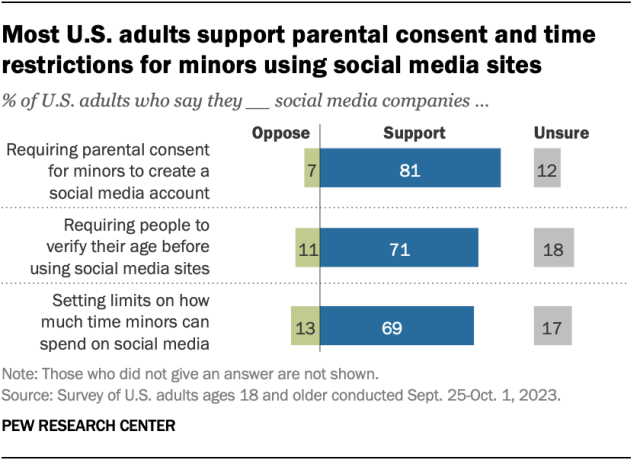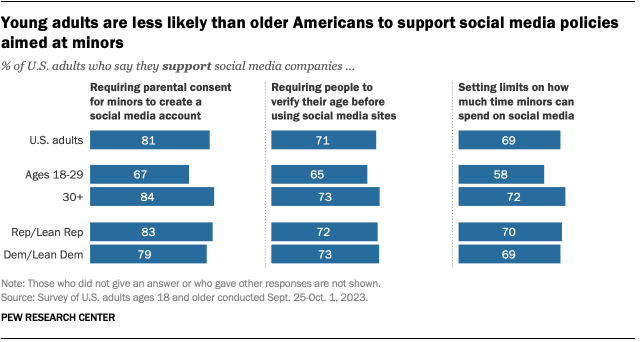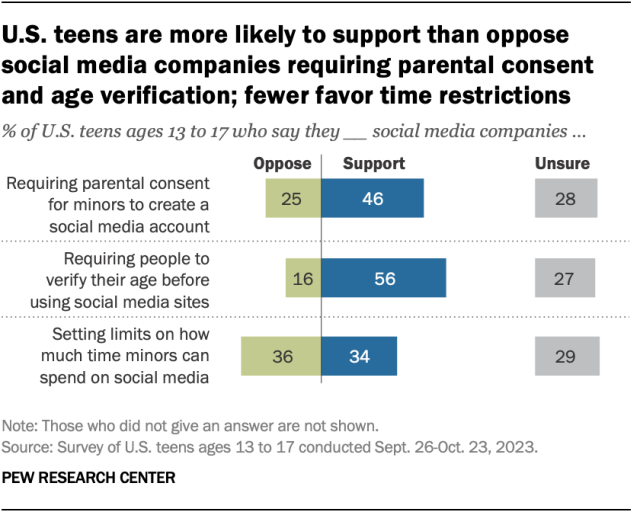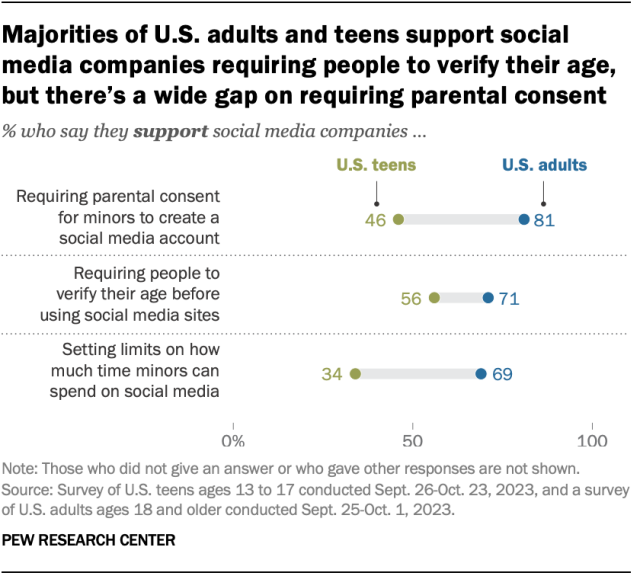More than 40 states and the District of Columbia are suing Meta, the parent company of Facebook and Instagram, alleging its platforms purposefully use addictive features that harm children’s mental health.
Amid this news, U.S. adults and teens are more likely to support than oppose requiring parental consent for minors to create a social media account and requiring people to verify their age before using these platforms, according to a pair of new Pew Research Center surveys. But adults are far more supportive than teens of these measures, as well as limiting how much time minors can spend on social media.
Pew Research Center conducted this study to understand American adults’ and teens’ views on ways social media companies could limit minors’ use of their platforms. This analysis uses data from two separate surveys, allowing us to compare the views of U.S. teens ages 13 to 17 with U.S. adults ages 18 and older.
For the analysis of teens, the Center conducted an online survey of 1,453 U.S. teens from Sept. 26 to Oct. 23, 2023, via Ipsos. Ipsos recruited the teens via their parents who were a part of its KnowledgePanel, a probability-based web panel recruited primarily through national, random sampling of residential addresses. The survey is weighted to be representative of U.S. teens ages 13 to 17 who live with parents by age, gender, race and ethnicity, household income and other categories. This research was reviewed and approved by an external institutional review board (IRB), Advarra, an independent committee of experts specializing in helping to protect the rights of research participants.
For the separate analysis of adults, the Center surveyed 8,842 U.S. adults from Sept. 25 to Oct. 1, 2023. Everyone who took part in the survey is a member of the Center’s American Trends Panel (ATP). This online survey panel is recruited through national, random sampling of residential addresses. This way nearly all U.S. adults have a chance of selection. The survey is weighted to be representative of the U.S. adult population by gender, race and ethnicity, partisan affiliation, education and other categories. Read more about the ATP’s methodology.
Here are the questions used for this analysis, along with responses, and its methodology.
Here’s a closer look at the findings from the two new surveys – one of adults and one of teens – which we conducted in late September through October, before the states’ lawsuit against Meta.
Adults’ views on social media policies aimed at minors

Most U.S. adults (81%) say they support social media companies requiring parental consent for minors to create a social media account. About seven-in-ten favor requiring people to verify their age before using social media sites (71%) and setting limits on how much time minors can spend on these platforms (69%). Only about one-in-ten adults oppose each of these three measures.
Still, some adults are uncertain. For example, roughly one-in-five adults are unsure if companies should require age verification (18%) or set time limits for minors (17%).
Views among adults by age, party and parental status
Many social media companies do not allow those under 13 to use their sites. Still, there’s a growing movement to develop stricter age verification measures, such as requiring users to provide government-issued identification. Legislators have pushed for mandatory parental consent and time restrictions for those under 18, arguing this will help parents better monitor what their children do on social media.
Our survey finds there is strong bipartisan support for these types of policies. Clear majorities of Republicans and Democrats – including independents who lean to either party – support parental consent, time limits for minors and age verification.

Majorities of adults across age groups support social media companies introducing these measures. But young adults are less supportive than their older counterparts. For example, 67% of those ages 18 to 29 say social media sites should require parental consent for minors to create an account, but this share rises to 84% among those ages 30 and older.
Additionally, majorities of parents and those without children back each of these measures, though support is somewhat higher among parents.
Teens’ views on social media policies for minors

Building on the Center’s previous studies of youth and social media, we asked U.S. teens ages 13 to 17 about their views on these measures.
Teens are more likely to support than oppose social media companies requiring parental consent for minors to create an account (46% vs. 25%). There’s even more support for requiring people to verify their age before using these sites – 56% of teens favor this, while 16% oppose it.
But their views are more divided when it comes to setting limits on how long minors can use these sites. Similar shares of teens support and oppose this (34% vs. 36%).
For each of these policies, about three-in-ten teens report being unsure if this is something social media companies should do.
How adults’ and teens’ views on social media policies differ

Adults are considerably more supportive of all three measures we asked about than are teens.
While 81% of U.S. adults support social media companies requiring parental consent for minors to create an account, that share drops to 46% among U.S. teens.
Adults are also about twice as likely as teens to support setting limits on how much time minors can spend on social media sites (69% vs. 34%).
But majorities of adults and teens alike support requiring people to verify their age before using social media sites. But on this, too, adults are more supportive than teens (71% vs. 56%).
Note: Here are the questions used for this analysis, along with responses, and its methodology.